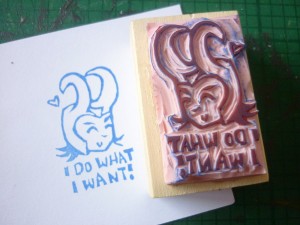Favor and disgrace are alarming
Honor and distresses visit the self.Why are favors and disgraces alarming?
Seeking favor is degrading,
alarming when it’s gotten,
alarming when it’s lost.Tao Te Ching, 13 Breath
Over the course of the last year, I feel like my personal approach to improv has changed drastically. I am moving towards being much more selfish in my improv. I can point to two things that I think are the root causes: the 2012 Seattle Festival of Improvisation, and having a second child.
The having a second child cause is super obvious: I have less time to give to improvisation, so I have to be selfish with that time. I can’t do all the improv that I might want to do, because there is not enough time for that. So I have found myself having to be very picky indeed with what shows/jams/classes I can participate in. An upside to this is that it has forced me to start thinking more about what improv is really important to me, and I think I am coming away with a clearer picture of who I am as an improviser. Downside of course is less improv.
The 2012 SFIT was slightly more complicated. I took some delightful workshops that year, and one of the things I really took home with me was the idea of improvising selfishly: to do the things that you want to be doing/that make you happy on stage. It really comes down to improvising from a place of inspiration rather than one of obligation. Improv, for the most part, is a team game, and so obligation will probably be present in some form, but it makes sense to me that inspiration will lead you to your best work. And if the things you want to be doing are disruptive to the show/group you are in? Guess what? You are in the wrong show/group. Get out. They probably aren’t paying you enough to do improv you don’t want to be doing.
So what does all this have to do with the Tao? Well, I’m going with the notion that “seeking favor” in this case refers to improvising with the intent of making an audience react. This can be anything from that line you thought of that you really want to work in to get a laugh all the way to trying to make Elicia cry. Seeking favor is degrading, as you are (I would bet) not doing the improv you want to do, but rather doing the improv you think the audience wants to see. You degrade your own work in order to keep banging on that Skinnerian treat bar, expecting another delicious yet fleeting pellet of audience reaction.
Let’s say you do get the reaction you were looking for: then what happens? You (the actor) have accomplished your objective (to get the reaction), so there are three big options for you:
- Search for a new objective. This will take a little bit of time, and it will probably be noticeable by the audience.
- Leave. Could be awkward, especially if you character has no motivation to do so.
- Call the scene. Only really an option in short form.
In any case, the favor of the audience was alarming to the scene.
Let’s say you didn’t get the reaction you were looking for. Then you will probably be up in your analytic brain trying to figure out why it didn’t work. Again, alarming to the scene.
Rather, if you improvise selfishly, with no regard to seeking the audience’s favor, then you are better prepared to be in the moment of the scene and be ready to jump on any inspiration that scene brings. I would definitely argue that the audience will enjoy that scene more than the one that happens to end on a big laugh line, and certainly more than the one that should have ended on that laugh line, continued anyway, and fizzled for lack of actor connection.
So I would encourage more people to improvise selfishly. If nothing else, I think it will make you think about yourself as an improviser and what you like about improv. And that’s a great first step to creating the improv show you want to be doing.

